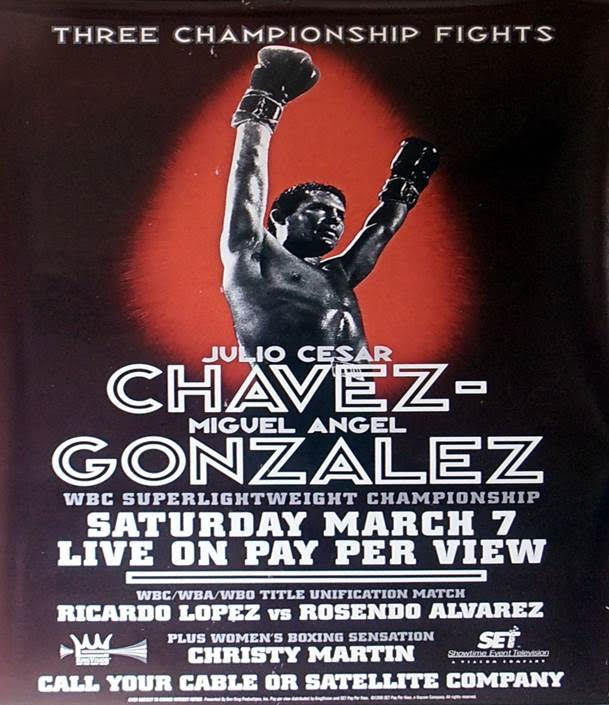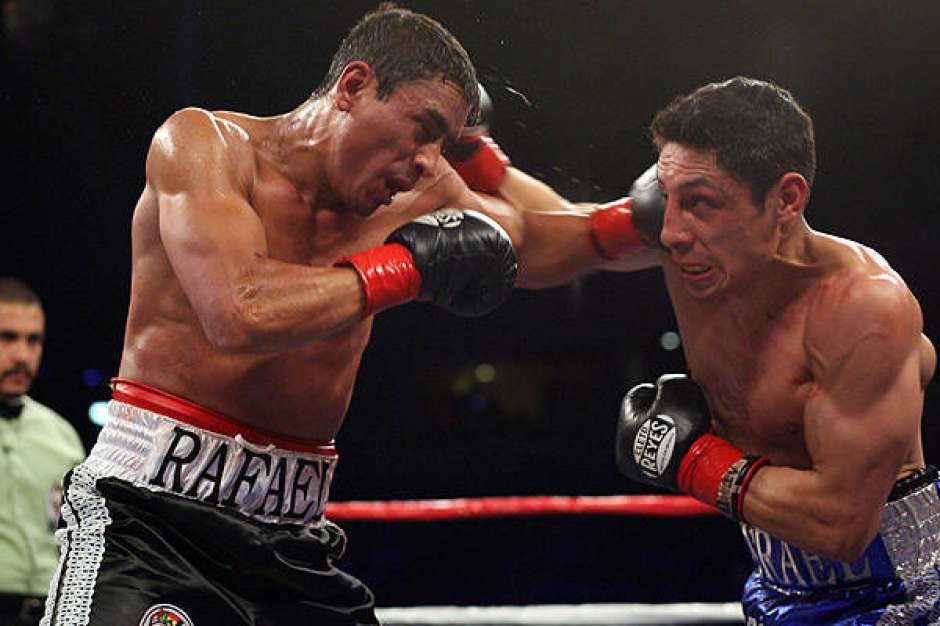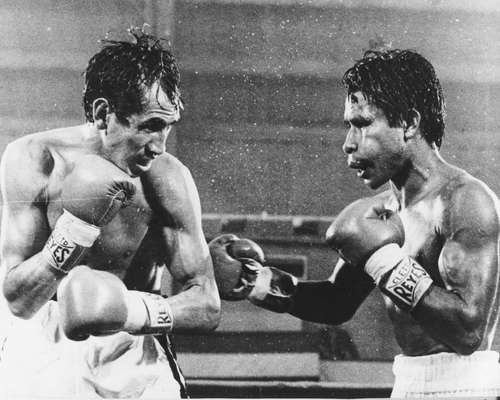With the likely war between Miguel Berchelt and Oscar Valdez less than a month away, IBHOF inductee Graham Houston looks back at some of the great all-Mexican battles in boxing history. Second of a two-part series.
Julio Cesar Chavez is generally considered the greatest of all Mexico’s fighters, a champion in three weight divisions and unbeaten in his first 90 fights. He won big all-Mexico fights with Mario “Azabache” Martinez at 130 pounds and Jose Luis Ramirez at 135. But his toughest fight against a fellow-Mexican was his 12-round draw with Miguel Angel Gonzalez for the vacant WBC 140-pound title.
This fight was outdoors at a Mexico City bull ring on March 7, 1998. Chavez was a fading fighter at the age of 35, although still capable. Gonzalez, 27, had lost only once in 43 fights, a unanimous decision against Oscar De La Hoya, who two years earlier had stopped Chavez in four rounds when JCC was cut on the bridge of the nose and over the left eye.
I was on site for Boxing Monthly at the Chavez vs Gonzalez bout, not ringside as such but seated in what was called the zona tecnica (“technical zone), which was below ring level and entailed peering up to watch the boxing. It wasn’t ideal. If the action drifted over to the far side of the ring, the fighters almost disappeared from view. While not having the best view of proceedings, I thought a draw looked reasonable. The crowd thought Chavez won.
The fight was closely contested and entertaining. British judge Larry O’Connell had Gonzalez winning by 116-114 (6-4-2 in rounds), San Francisco judge Terry Smith had it 115-114 in favour of Chavez (6-5-1 in rounds) while veteran Los Angeles judge Chuck Hassett had it a draw, 115-115 ( (5-5-2). But the real story, for me, was that when I checked the master scoresheet at a cramped ringside, the Chuck Hassett scorecard didn’t tally with the official result. In fact, Hassett’s score, as it appeared on the master scoresheet (or “concentration of scores” sheet as some call it) came out at 6-5-1 in rounds in favour of Gonzalez.
WBC president Jose Sulaiman later explained that there had been an error in transcribing the scores. The master scoresheet showed Hassett having given the sixth round to Gonzalez but, Sen. Sulaiman later explained, Hassett had actually scored the sixth round 10-10.
The WBC subsequently sent me copies of all the scoring slips from rounds 1-12 as verification. But editor Glyn Leach was unconvinced, using strong wording in the Boxing Monthly headline and standfirst. (For non-media folks a “standfirst” in British publishing is the introductory summary to an article).
As to the fight itself, Gonzalez was busier but Chavez’ blows looked harder. Chavez fought in spurts but tended to finish rounds strongly. Gonzalez’ left eye was bruised and swollen and he had a cut over the eye while Chavez suffered a bloody nose and his left eye was beginning to close from below by the later rounds. Gonzalez staged a big finish, backing up Chavez in the last round. “Had this been one of the classic 15-round title fights, Gonzalez surely would have outlasted the older man,” I reported in Boxing Monthly. Jose Sulaiman told me he felt that neither man deserved to lose, and perhaps he was right.

While Chavez vs Gonzalez had a disputed outcome with a whiff of controversy, there was nothing debatable about Carlos Zarate’s victory over Alfonso Zamora in a clash of undefeated bantamweight champions — with neither man’s title at stake — at the Inglewood Forum, Los Angeles, on April 23, 1977.
Zarate, the WBC champion (45-0, 44 KOs) knocked out Zamora (29-0, 29 KOs), who held the WBA title, in the fourth of a scheduled 10-rounder. But it was exciting while it lasted — including an unscheduled interruption to hostilities.
Action in the ring was paused in a bizarre incident in the opening round when a man wearing shorts and a vest (or singlet for US readers) vaulted over the top rope into the ring and seemed to strike a martial-arts pose. Five white-helmeted police officers wasted little time in tossing the interloper through the ropes and literally dragging him away as the fighters and referee Richard Steele looked on in astonishment.
When the bout resumed, both Zarate and Zamora loaded up on big shots. Tall and rangy, Zarate looked the bigger man but Zamora seemed to stagger him with a left hook just before the opening round ended.
The pace was fast and it was furious, each man trying to blast the other out of the fight, but Zarate was the more skilled, more measured fighter and by the end of the third round he was hurting Zamora and backing him up. A right hand followed by a short left hook send Zamora to his knees, and although he beat the count and survived the remaining seconds of the third round it was obvious, watching the video of the fight, that the end was near.
Two knockdowns ended the fight in the fourth round. The second time Zamora went down, falling limply after being on the receiving end of a series of hooks and uppercuts, it was clear he was never going to get up inside 10 seconds. Referee Steele counted to five and then waved the finish as Zamora’s corner threw in the towel.
The four-fight series between 122-pound champions Rafael Marquez and Israel Vazquez matched Zarate-Zamora for fierce, back-and-forth action. Well, the first three fights did. By the time the fourth meeting took place, Vazquez was a diminished fighter.
Marquez and Vazquez split the series — the meetings taking place between 2007 and 2010 — two wins each and three of the fights ending inside the distance. The greatest meeting between the two warriors took place in the Los Angeles suburb of Carson, California on March 1, 2008, when Vazquez won a desperately hard-fought, split decision.
Marquez dropped Vazquez in the fourth and was in front on all cards after seven rounds. But Vazquez was the stronger man from the eighth round onward, pressing forward and landing right hands that had Marquez’s left eye partly closing from underneath. And Vazquez made sure of victory by hammering Marquez around the ring in the last round.
With the fight almost over, Vazquez sent his rival lurching back into the ropes and referee Pat Russell imposed the mandatory eight count as Marquez protested. “What a spectacular finish from Israel Vazquez!” commentator Steve Albert exclaimed in the Showtime broadcast. Vazquez finished with eyes bruised and swollen and a cut over each eye, but he was a worthy winner.
The fourth meeting, in May 2010, was the only one-sided bout of the series. A faded Vazquez did manage to land a good left hook in the first round but, once again cut over both eyes, he was dropped in the third and turned away under Marquez’s follow-up onslaught, bringing the intervention of referee Raul Caiz Jr.

Photo: WBC.
Vazquez, a true give-and-take warrior, also had an all-Mexico series of fights with Oscar Larios, who went on to win the 122lbs title. Vazquez won the first meeting on a first-round KO in Mexico City in 1997, lost the rematch on a last-round TKO in Sacramento five years later but won the rubber match on a third-round KO to take the WBC 122lbs title from Larios at the Mandalay Bay casino resort in Las Vegas in December 2005.
And talking about Mexican blood-and-guts warriors, Jorge “Travieso” Arce figured in his share of stirring battles. Arce overpowered some excellent boxers but the southpaw Cristian Mijares was too skilful for him in an all-Mexico clash for Mijares’ WBC 115lbs title in San Antonio on April 14, 2007. It was a bloody fight— and the blood was Arce’s. He was cut on the bridge of the nose and over the left eye.
Mijares beat Arce by wide margins on the judges’ cards, just about as clear a winner as there could be. But there was disagreement over the result in another all-Mexico championship fight when Lupe Pintor climbed off the canvas to win a split decision over Carlos Zarate to take Zarate’s WBC bantamweight title at Caesars Palace, Las Vegas on June 2, 1979.
Pintor’s win got a mixed reception from the crowd. ABC Wide World of Sports commentator Chris Schenkel (doing solo duty on the broadcast) had Zarate winning. He described Zarate as being “absolutely stunned” by the decision.
Zarate and Pintor had been sparmates, and at times the pace of the contest was a bit too slow for the liking of the Mexican aficionados in the crowd. Nevertheless, this was tense, absorbing contest with a high level of technical prowess. Zarate scored a knockdown in the fourth round, but Pintor buckled the champion’s legs with a left hook in the 10th round and staggered him with a right hand in the 14th.
Pintor looked the worse for wear at the finish, with a cut over his left eye and puffy features, but he was the fighter who was going forward throughout the 15 rounds. One judge had Zarate winning by a strange score of 145-133. But the other two judges saw Pintor as a one-point winner, each having him ahead by the same margin, 143-142. “I thought I had won the fight all the way,” Zarate said afterwards. “How can one guy have me in front by so much and the others have me losing?”
It all came down to the last round (as actor and fight fan Ryan O’Neal astutely predicted it would in a guest appearance at ringside before the start of final round). Judges Bob Martin (the 145-133 guy) and Harold Buck gave Zarate the 15th round, but judge Art Lurie gave the 15th to Pintor. If Lurie had scored the 15th in Zarate’s favour, the fight would have been a draw.
Judge Bob Martin’s scoring was odd in the extreme: he gave Zarate a 10-6 round in the fourth and gave him three 10-8 rounds while giving Pintor two 10-8 rounds. Throwing out this judge’s absurd interpretation, Pintor vs Zarate was as close as it gets in still another classic all-Mexico encounter.

Photo: Boxrec
Yet while it’s a rarity for an all-Mexico fight to disappoint, one that did was Canelo Alvarez’s lopsided decision win over Julio Cesar Chavez Jr. at the T-Mobile Arena in Las Vegas on May 6, 2017. It was a non-title 12-rounder made at catchweight, each boxer scaling 164lbs.
Chavez was never in the fight, losing every round on the judges’ cards. Canelo was hitting him at will up, and down, at times almost playing with the son of a Mexican ring legend. A section of the 20,000 crowd started booing in the 11th round. “And no doubt they are booing Julio Cesar Chavez Jr for what they will see as a less than exemplary effort from a Mexican star fighter,” Jim Lampley noted in the HBO PPV commentary.
But one disappointing fight out of the many all-Mexico meetings was surely the exception that proves the rule.
When top-level Mexican fighters go against each the result is invariably a contest that provides excitement and technical excellence — and such is expected to be the case when 130lbs champion Miguel Berchelt defends his title against unbeaten two-time Mexican Olympic representative Oscar Valdez in Las Vegas on February 20. (Berchelt has already been a participant in one stirring all-Mexico battle — his bloody 11th round KO win over Francisco Vargas to become WBC champion in 2017.) Berchelt vs Valdez is quite simply one of the most compelling match-ups on the fistic horizon, and one that looks likely to take its place with Mexico’s great civil wars of the ring.
Read Mexican Civil Wars – Part One
Main image: Zarate vs Zamora/WBC.